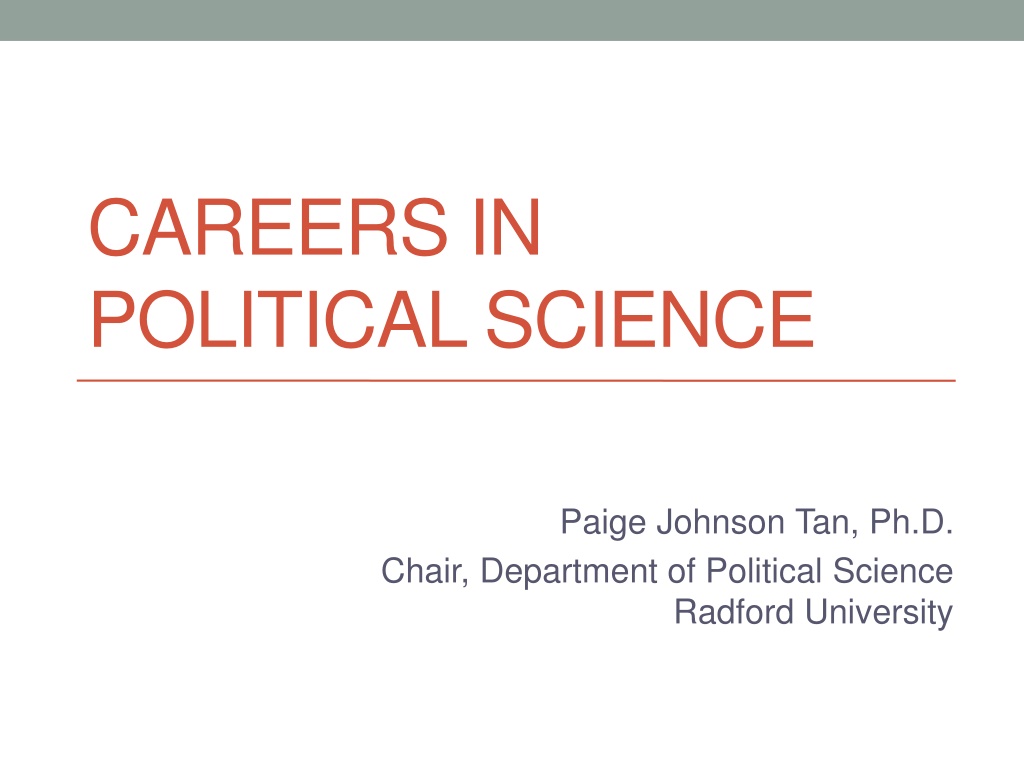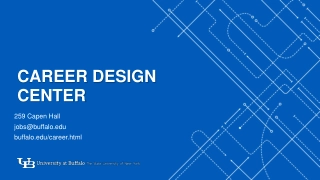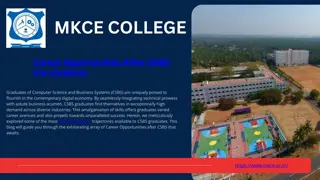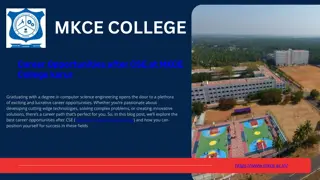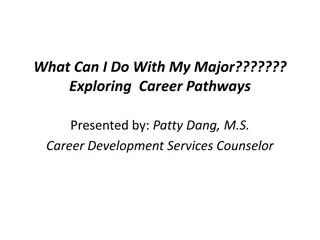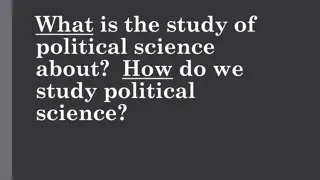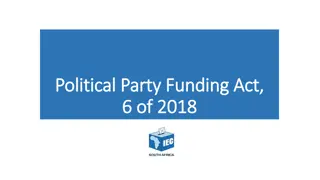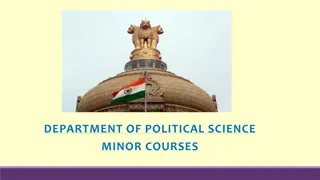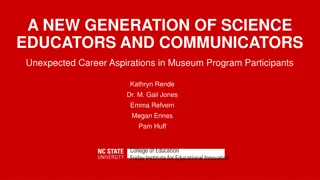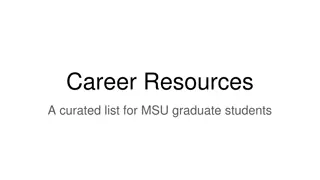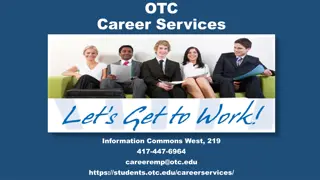Career Opportunities in Political Science
Explore the diverse career paths available with a degree in Political Science. Develop essential skills such as critical thinking, communication, and problem-solving. Get tips on succeeding at Radford University and preparing for future job searches. Discover job opportunities in government, international organizations, non-profits, academia, and more. Utilize resources like the Career Center, internships, and networking to kickstart your political science career.
Download Presentation

Please find below an Image/Link to download the presentation.
The content on the website is provided AS IS for your information and personal use only. It may not be sold, licensed, or shared on other websites without obtaining consent from the author.If you encounter any issues during the download, it is possible that the publisher has removed the file from their server.
You are allowed to download the files provided on this website for personal or commercial use, subject to the condition that they are used lawfully. All files are the property of their respective owners.
The content on the website is provided AS IS for your information and personal use only. It may not be sold, licensed, or shared on other websites without obtaining consent from the author.
E N D
Presentation Transcript
CAREERS IN POLITICAL SCIENCE Paige Johnson Tan, Ph.D. Chair, Department of Political Science Radford University
Political Science Prepares You . . . With Skills Employers Say They Want: Critical thinking Information literacy Oral and written communication Ethical citizenship Problem solving Understanding of diversity/global issues Collaboration Use these terms in your cover letters, resum s, and applications. Be prepared to illustrate how you ve developed them through projects, papers, in- class activities, extracurricular activities, internships, and jobs.
Be a Skillseeker http://uncw.edu/career/skillseeker.html
Things To Do While at Radford for Success Later Careers class. Get help from Career Center to develop professional job search documents (resume, cover letters, portfolio). Get help from Career Center/Alumni with informational interviews of alums in fields you are interested in. Get to know your professors, so you have references and rec letter contacts. Spend time in office hours. Attend talks on campus. Become more worldly. Ask questions. Join a club (Model UN, Political Science Society). Study abroad (show you re independent, adaptable, and international). Intern. Apply early. Good internships deadlines October for the following summer. Read real, quality news sources, so you can have adult conversations.
Political Science Careers Political Science Prepares You To Work For: State and local government (town manager, city planner, HR, tax). Federal agencies (Defense, CIA, FBI, Interior, State Department, National Parks, Justice, Commerce, Peace Corps, ICE). International organizations (United Nations, World Food Program, UNHCR, World Bank). Non-profit organizations (Amnesty International, Environmental Defense Fund). Economic aid agencies (Save the Children, World Vision, US Aid). Political aid agencies (National Democratic Institute, International Republican Institute, National Endowment for Democracy, IFES). Corporations (Government relations/lobbying). Academia and think tanks (University professor, researcher). Activism (political parties, political campaigns). Law (lawyer, paralegal).
Job Search Network (Linkedin, professional associations, informational interviews). Hire a Highlander. POSC Careers website (choose the spreadsheet on the right hand side). Think of organizations you d like to work for and search their careers and internships sections for opportunities. Indeed.com (search job and area). USAJobs.gov for government jobs. Don t use: Monster.com (thousands of applicants per position). Beware of job search scams. Asking you for personal information, money.
Found a Job: Ready to Apply Resum s A one-to-two page statement of your knowledge, skills, and abilities geared to obtaining a professional position.
Tips Resum standard is reverse chronological. Don t lie. Be aware of keyword searching (many times the first cut of resum s will be by a computer, get the right words in there). The resum should be skim-readable by a human reviewer in 30 seconds. That s all the time you have to grab their attention. Take anything from high school and earlier off (unless it s completely amazing, Olympian!). No reference list or references available on request. This is wasted space. Appearance must be perfect: Periods at the end of all lines. Bullets all line up. Dates line up. Spelling flawless. No crazy colored paper or scents (see Elle Woods in Legally Blonde). No extraneous personal information (love football, single, hope to travel). NOTE: Rehashing your old resum from your drug store job won t do. You must update your resum thoroughly. The resum must be tailored toward obtaining a (preferably specific) professional position or admission to graduate school.
Sample Resum Review and critique resum . NEED LINK. Radford University Career Center Tips for Resum s and Cover Letters http://www.radford.edu/content/career- services/home/students/resume-cover-letter.html Purdue University OWL: https://owl.english.purdue.edu/owl/
Ready to Apply: Cover Letters Standard tips for the structure of your cover letter: Sentence 1: How I found out about the job. 1stparagraph. Why them? Show you ve done research on the company/organization. 2nd paragraph. Why you? Highlight important aspects of your resum , but go more in depth. Don t just repeat. 3rd paragraph. How to contact you. Important note: Authors sometimes focus on their attitude toward the proposed job. I am so excited to work for XXXXX. The company doesn t care how excited you are. Focus in your letter on company s needs, the requirements of job, and how you can fill those needs/do the job.
My Take on the Cover Letter When I write cover letters, I focus on the key competencies from the job ad (four to five) and show how I meet them with extensive examples. I do not use the 1st paragraph above from the standard tips. I find as this is typically written it usually turns into drivel about how much you ve dreamed about working at the company since grade school. It does nothing to sell your candidacy. It is useless to both you and the hiring organization.
Tips Dear Ms. Jobgiver: (colon) Create a personal letterhead with a striking font of your name, address, phone, and e-mail address (striking, not freaky) Resum (insert symbol, accent ) Under recipient s address, before salutation, use Re: Legislative Intern Position.
Resum Got You Noticed. Now, Time to Interview Learn everything you can about the company/organization. Prepare answers to common questions (Google, check the Career Center). Tell me about a time when you ve persuaded others to adopt your ideas. Give me an example of your ability to make decisions under pressure. Tell me about your experience in dealing with a variety of different people. Tell me about a time when your first solution didn t solve a problem. What did you do?
Interview Tips Stay positive. Don t badmouth previous employers (the new folks will imagine you doing it to them some day!). Actively listen. The interviewer is sending important signals about the work environment. Do you want to work for them? Don t be a supplicant. Be confident, enthusiastic. Be positive about you and what you can do.
Interview Tips Eye contact, eye contact, eye contact. Reflects on your interest, confidence, and trustworthiness. No lame handshakes. Man or woman, firm and strong (but not crushing). Be polite to everyone, including the receptionist. Sit up straight. No nervous habits, playing with hair, fidgeting. Be yourself. You can t fake it for three years if the fit isn t right.
More on Interviewing Whatever you re asked, add in relation to the position to the question. So, the interviewer says Tell me about yourself, and then you add in relation to the position to decide how to answer. Going in to the interview, be sure you can talk about your strengths (5-8 of them!) and be able to illustrate each with examples. Be able to address your REAL weaknesses and don t give a fake weakness strength. I m just too much of a perfectionist! Be able to address anything negative in your application, bad GPA, bad semester of school.
More on Interviewing You ll be asked why do you want to work here. Have a good answer. Do research and be able to discuss in relation to your own personal/professional goals. A final question is What questions do you have for us? What questions you ask reveals something about your interests and priorities. You should have questions but ask some of substance, about advancement opportunities, potential training opportunities. Not all about how much vacation time (that suggests you re thinking more about not being at work than being at work!).
Questions for Them What are the main objectives that you have for this position? Describe the typical first assignments. What are the challenging aspects of the job? What is your organization's culture? What do you enjoy/dislike about working here? What characteristics does a successful person have at your organization? Will there be opportunities for increased responsibility and broader experience? How will I and how often will I be evaluated? Who does the evaluation?
Whos Who and What is Their Interest in You/the Position? Not all interviewers are equal. Some have direct hire authority. Want a good worker. Some meet out of politeness. Want a good colleague. Some meet because they meet all women interviewing for positions. Want to encourage you to stay in the process, take the job. Some are engaged in political battles within the organization and your position is part of the war. Hard to tell what they want unless you know what the war is about. Is the organization going in this direction or that one?
Things to Bring to an Interview Pen, paper. Questions. Research on people you ll be meeting, company/organization. Portfolio? Copies of resum for everyone you ll be meeting. Turn off your phone and put it away.
Phone Interviews Used to winnow down a pool to decide who gets invited for final interview. Special difficulty. Don t have visual clues. Don t know if they re responding well or if they hate you . . . Hard to know when to talk, especially when speaking to a panel of interviewers. Nail down place (quiet)/time (timezone). No cellphone, if at all possible. Don t talk too little; don t talk too much.
After the Interview Follow up with a thank-you letter (in some cases, an e- mail is okay).
Practice! Practice! Practice! We are not all born interviewees. You must WORK to develop this skill. Practice on your Mom, Dad, cat, boyfriend, pal, classmate. https://radford.biginterview.com/
Youve Got a Job: Professionalism in the Workplace Make your employer s life easier. Anticipate problems and solve problems for your boss. Ask questions. Do you want double sided copies, stapled, will a .pdf do? Have mastered basic skills: error-free writing, oral communication. Act professionally with clients and co-workers. Work on people skills. It s not all just about technology. Be able to manage time. Arrive early, leave late.
Skills Employers Want You to Have Prioritize. Inter-personal skills. Be able to have a conversation with another adult that doesn t involve texting. Team work. Work hard. Take pride in your work. Avoid time wasters like personal calls, texting, and Facebook. Evidence integrity in all your dealings with/about your work.
Skills Employers Want You to Have Show an interest in your organization, company. Think about opportunities and trends that affect. Apply your creativity to the solution of problems even in your off hours. Knowledge of basic software: internet search, Word, PowerPoint, Excel. Be able to think critically. How does today s issue relate to broader trends? How does it relate to what company B is facing? Can we un-think and do things a different way and do things better? Continue learning. Do trainings, attend conferences and seminars.
Skills Employers Want You to Have Be confident yet humble. Be willing to be corrected. Seek out feedback on how to improve. (Don t be a know-it-all when you re just starting out.) Dress professionally. Make a good first impression. Go to sleep at a decent hour, so you re ready to go for work the next day. Maybe stop watching late-night comedy if you need more sleep.
